牛津译林版九年级上册Unit 2 Colour Grammar Object clauses introduced by that 课件(共25张PPT)
文档属性
| 名称 | 牛津译林版九年级上册Unit 2 Colour Grammar Object clauses introduced by that 课件(共25张PPT) | 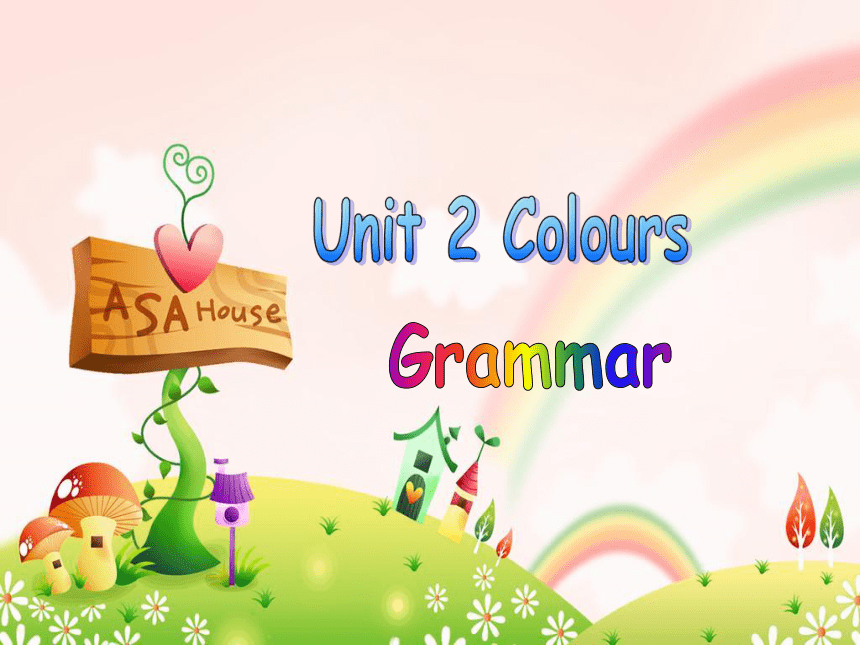 | |
| 格式 | ppt | ||
| 文件大小 | 1.7MB | ||
| 资源类型 | 教案 | ||
| 版本资源 | 牛津译林版 | ||
| 科目 | 英语 | ||
| 更新时间 | 2022-12-04 17:38:55 | ||
图片预览

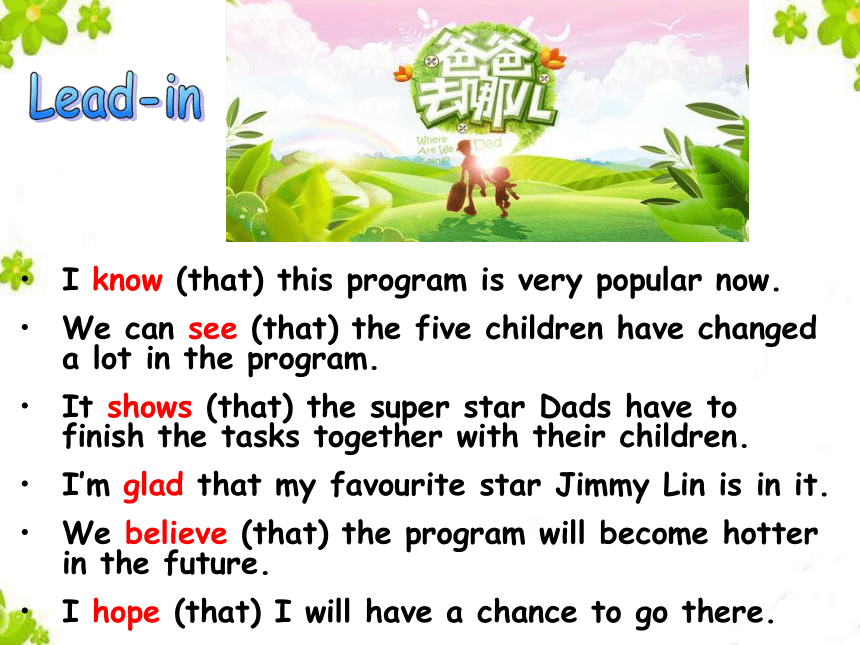
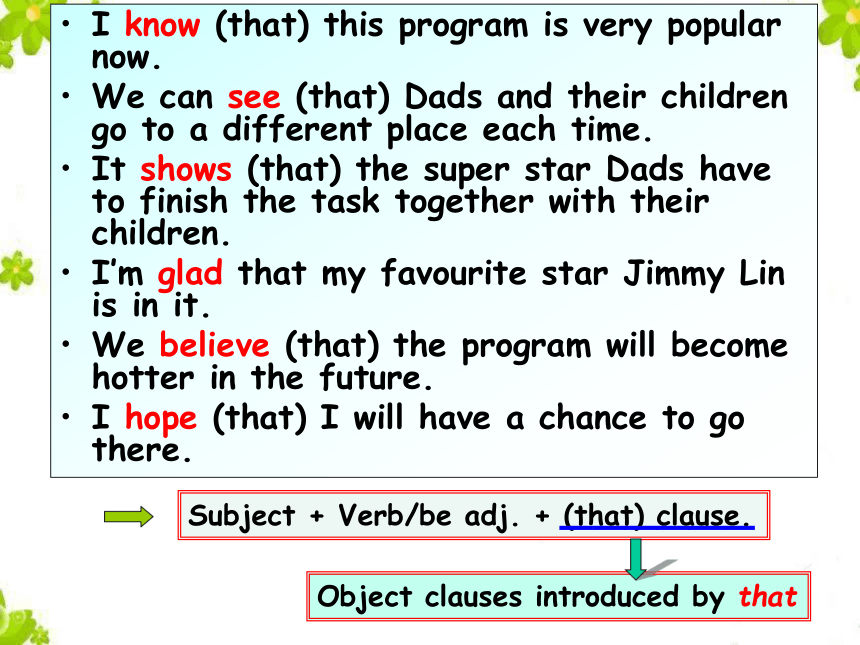

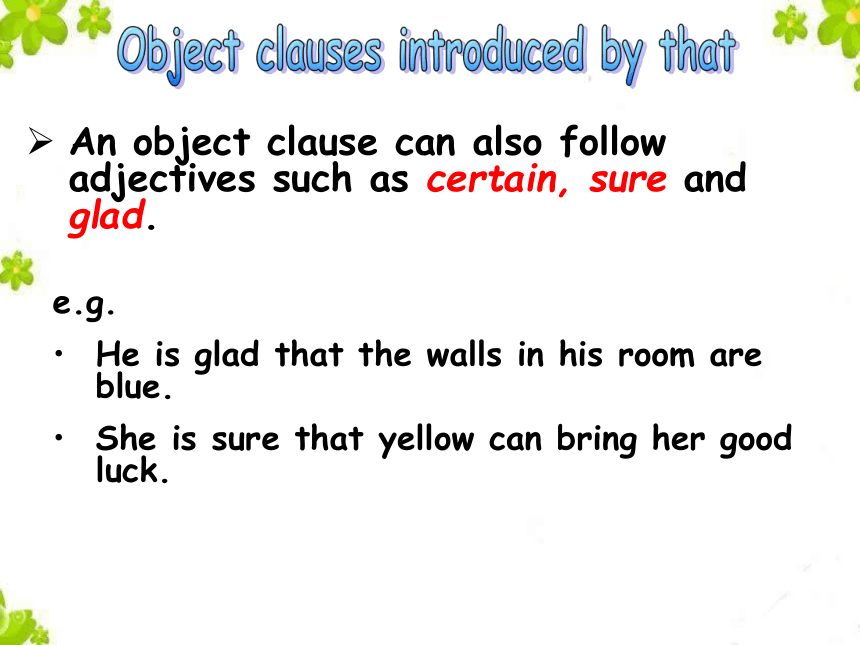
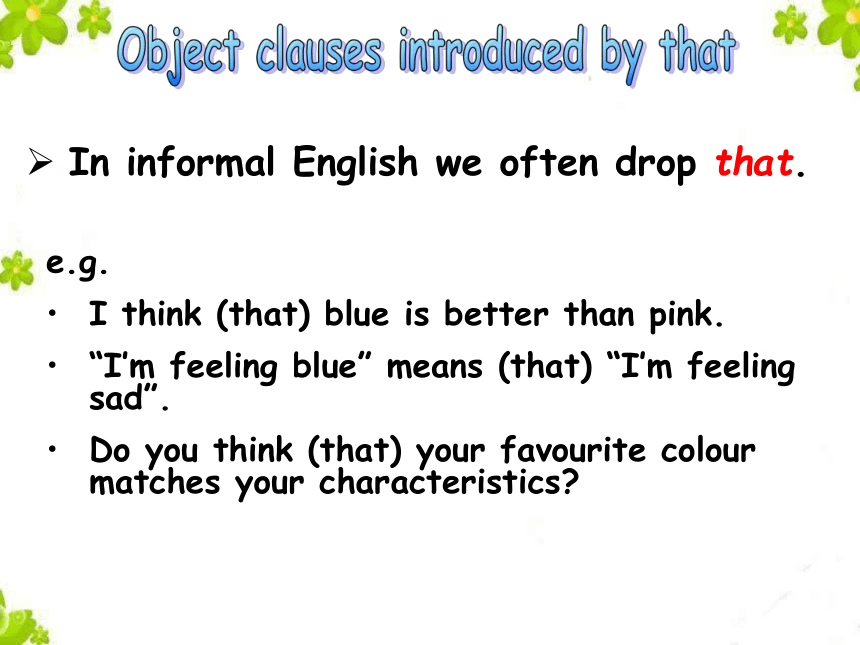
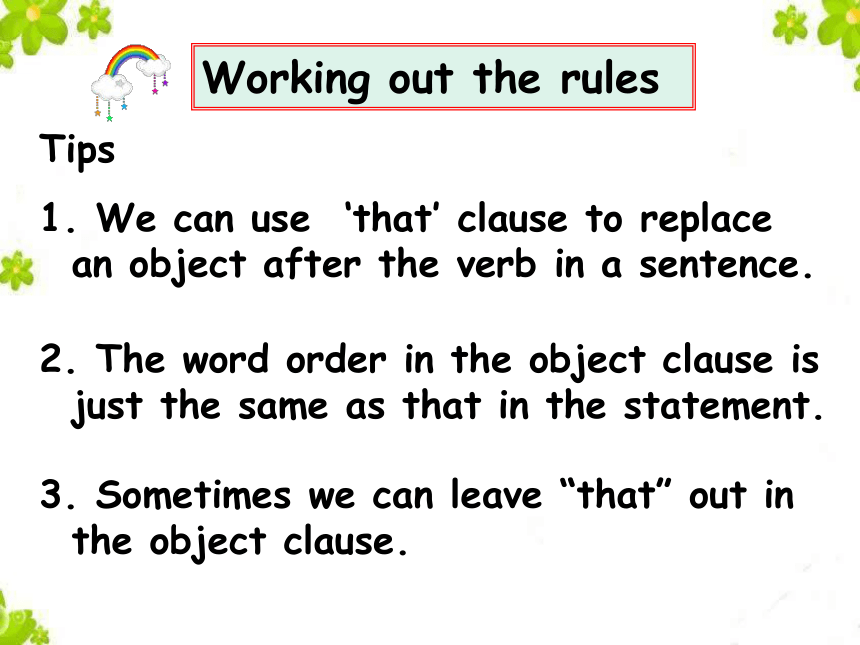
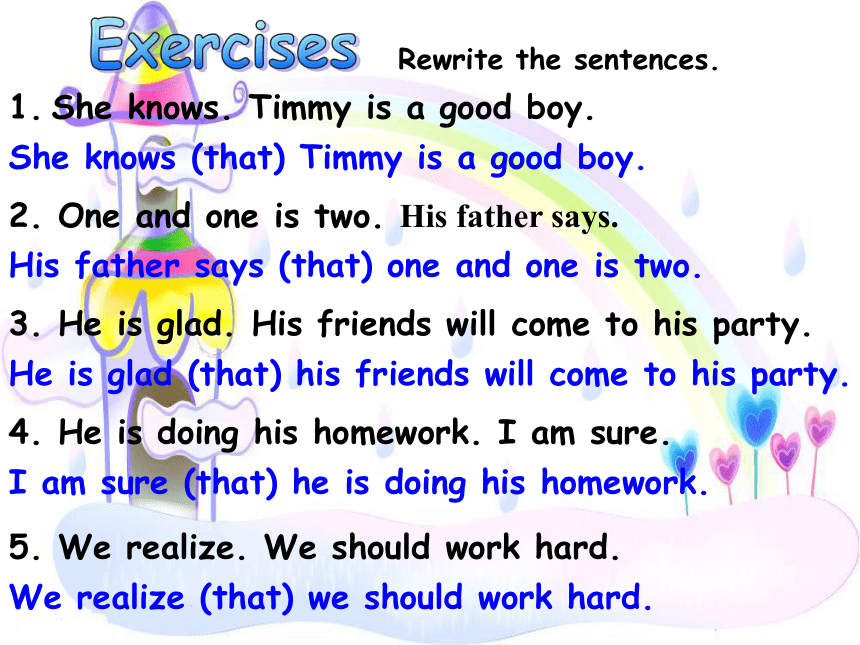
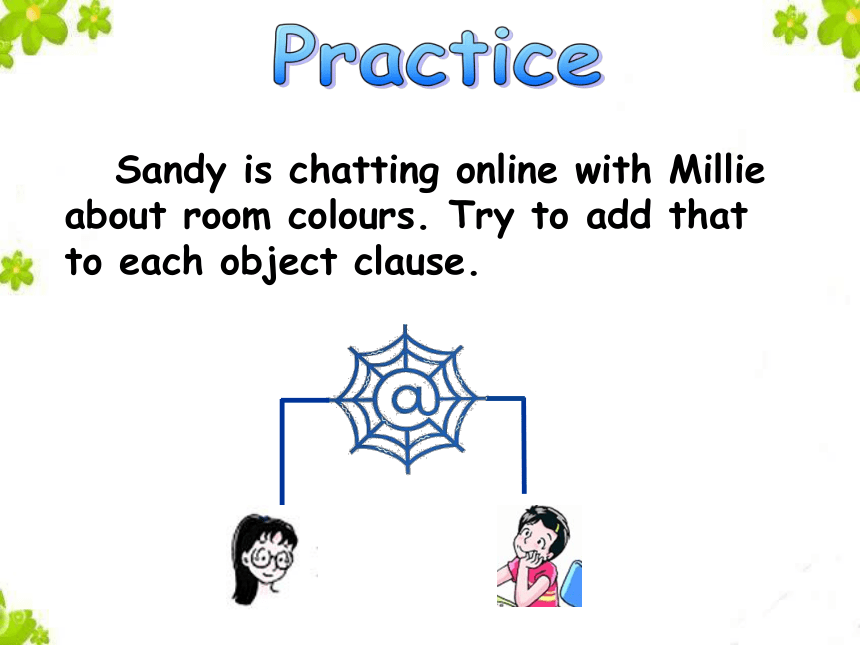
文档简介
(共25张PPT)
I know (that) this program is very popular now.
We can see (that) the five children have changed a lot in the program.
It shows (that) the super star Dads have to finish the tasks together with their children.
I’m glad that my favourite star Jimmy Lin is in it.
We believe (that) the program will become hotter in the future.
I hope (that) I will have a chance to go there.
I know (that) this program is very popular now.
We can see (that) Dads and their children go to a different place each time.
It shows (that) the super star Dads have to finish the task together with their children.
I’m glad that my favourite star Jimmy Lin is in it.
We believe (that) the program will become hotter in the future.
I hope (that) I will have a chance to go there.
Subject + Verb/be adj. + (that) clause.
Object clauses introduced by that
______
An object clause functions as the object of a sentence. We use that to introduce an object clause that is a statement.
An object clause can be put after verbs such as say, find, know, think, believe, hope, notice and mean.
e.g.
Some people believe that colours can influence our moods.
She hopes that yellow can bring her success.
An object clause can also follow adjectives such as certain, sure and glad.
e.g.
He is glad that the walls in his room are blue.
She is sure that yellow can bring her good luck.
In informal English we often drop that.
e.g.
I think (that) blue is better than pink.
“I’m feeling blue” means (that) “I’m feeling sad”.
Do you think (that) your favourite colour matches your characteristics
Tips
1. We can use ‘that’ clause to replace an object after the verb in a sentence.
2. The word order in the object clause is just the same as that in the statement.
3. Sometimes we can leave “that” out in the object clause.
Working out the rules
She knows. Timmy is a good boy.
2. One and one is two. His father says.
3. He is glad. His friends will come to his party.
4. He is doing his homework. I am sure.
5. We realize. We should work hard.
She knows (that) Timmy is a good boy.
His father says (that) one and one is two.
He is glad (that) his friends will come to his party.
I am sure (that) he is doing his homework.
We realize (that) we should work hard.
Rewrite the sentences.
Sandy is chatting online with Millie about room colours. Try to add that to each object clause.
Millie: Did you know there is a relationship between
colours and moods
Sandy: Certainly. I think colours influence our everyday
lives in many ways.
Millie: How should we choose the colours for the rooms
of a house
Sandy: Most people think light colours are better than
dark ones.
Millie: Yes. I notice light colours make rooms seem larger.
Sandy: Sure. I also know blue can make us feel relaxed
Millie: Yes. My mum says blue is suitable for bedrooms.
I also find some people prefer orange for their
dining rooms.
Sandy: True, but it depends on personal taste. Anyway,
we should choose the colour which makes us fell
comfortable.
∧
(that)
∧
(that)
∧
(that)
∧
(that)
∧
(that)
∧
(that)
∧
(that)
Is it more interesting than the first season
Will we see more stars in it
Do we have time to watch it now
Can we feel the love of family
Is it more interesting than the first season
Millie wonders if/whether it is more interesting than the first season.
Will we see more stars in it
Millie wonders if/whether we will see more stars in it.
Do we have time to watch it now
Millie wonders if/whether we have time to watch it now.
Can we feel the love of family
Millie wonders if/whether we can feel the love of family.
Is it more interesting than the first season
Will we see more stars in it
Do we have time to watch the program now
Can we feel the love of family
Yes/no questions
S+V+if/whether +a statement.
Object clauses introduced by if or whether
Millie wonders
if/whether it is more interesting than the first season.
if/whether we will see more stars in it.
if/whether we have time to watch it now.
if/whether we can feel the love of family.
__________
We use if or whether to introduce an object clause that expresses a yes/no question.
Such an object clause often follows verbs such as ask, see, wonder and find out.
The word order in the clause should be the same as that in a statement.
e.g.
You may wonder if/whether colours influence our moods.
Sandy asks if/whether orange can cheer her up.
Is it easy to understand the grammar
( I want to know )
I want to know
if/whether
It is easy to understand the grammar.
it is easy to understand the grammar.
if/whether she should choose the red dress
Problems about shopping
if/whether white clothes suit her
if/whether the sports bag is made of cotton
if/whether the green T-shirt matches his trousers.
if/whether he should stay at home instead of going shopping with his classmates.
stay at home instead of going
shopping with my classmates
often
Help Daniel complete his email using that, if or whether.
that
if/whether
if/whether
that
that
if/whether
Help Daniel write a note for his dad.
(that) Dad knows a lot about colours
if/whether red is just the colour of heat and power
if/whether yellow was once the colour of the rulers in ancient China
if/whether the rulers in ancient Europe liked to wear purple
if/whether all the doctors in the world wear white uniforms
1.在介词后面:
We are worried about whether it will rain tomorrow.
2.在动词不定式前:
He can’t decide whether to go to Canada.
In these cases, we can only use whether instead of if.
3.当与or或or not连用时:
I don’t know whether he’s free or not.
She asks me whether I am from Yancheng or Nanjing.
4.宾语从句提前时:
Whether this is true or not, I can’t say.
Choose the right answer.
1. I haven’t decide ____ I’ll go out or stay at home.
A. if B. when
C. why D. whether
2. I want to know ___ you love English.
A. that B. what
C. if D. who
√
√
3. I wonder ____ our teacher will come to my birthday party.
A. whether B. why
C. where D. that
4. I’d like to know ________ or not.
A. whether will he come
B. whether has he come
C. whether he will come
D. that he will come
√
√
Fill in the blanks with if or whether.
1. Uncle John came up to see _________ there was anything wrong with the computer.
2. The shopkeeper asked my father ________ or not he wanted to choose a big Christmas tree.
3. I don’t know __________ to go or stay
4. _______ time runs out, what should we do
5. ________ they will ever become future Olympic champions, only time will tell.
if/whether
whether
whether
Whether
If
I know (that) this program is very popular now.
We can see (that) the five children have changed a lot in the program.
It shows (that) the super star Dads have to finish the tasks together with their children.
I’m glad that my favourite star Jimmy Lin is in it.
We believe (that) the program will become hotter in the future.
I hope (that) I will have a chance to go there.
I know (that) this program is very popular now.
We can see (that) Dads and their children go to a different place each time.
It shows (that) the super star Dads have to finish the task together with their children.
I’m glad that my favourite star Jimmy Lin is in it.
We believe (that) the program will become hotter in the future.
I hope (that) I will have a chance to go there.
Subject + Verb/be adj. + (that) clause.
Object clauses introduced by that
______
An object clause functions as the object of a sentence. We use that to introduce an object clause that is a statement.
An object clause can be put after verbs such as say, find, know, think, believe, hope, notice and mean.
e.g.
Some people believe that colours can influence our moods.
She hopes that yellow can bring her success.
An object clause can also follow adjectives such as certain, sure and glad.
e.g.
He is glad that the walls in his room are blue.
She is sure that yellow can bring her good luck.
In informal English we often drop that.
e.g.
I think (that) blue is better than pink.
“I’m feeling blue” means (that) “I’m feeling sad”.
Do you think (that) your favourite colour matches your characteristics
Tips
1. We can use ‘that’ clause to replace an object after the verb in a sentence.
2. The word order in the object clause is just the same as that in the statement.
3. Sometimes we can leave “that” out in the object clause.
Working out the rules
She knows. Timmy is a good boy.
2. One and one is two. His father says.
3. He is glad. His friends will come to his party.
4. He is doing his homework. I am sure.
5. We realize. We should work hard.
She knows (that) Timmy is a good boy.
His father says (that) one and one is two.
He is glad (that) his friends will come to his party.
I am sure (that) he is doing his homework.
We realize (that) we should work hard.
Rewrite the sentences.
Sandy is chatting online with Millie about room colours. Try to add that to each object clause.
Millie: Did you know there is a relationship between
colours and moods
Sandy: Certainly. I think colours influence our everyday
lives in many ways.
Millie: How should we choose the colours for the rooms
of a house
Sandy: Most people think light colours are better than
dark ones.
Millie: Yes. I notice light colours make rooms seem larger.
Sandy: Sure. I also know blue can make us feel relaxed
Millie: Yes. My mum says blue is suitable for bedrooms.
I also find some people prefer orange for their
dining rooms.
Sandy: True, but it depends on personal taste. Anyway,
we should choose the colour which makes us fell
comfortable.
∧
(that)
∧
(that)
∧
(that)
∧
(that)
∧
(that)
∧
(that)
∧
(that)
Is it more interesting than the first season
Will we see more stars in it
Do we have time to watch it now
Can we feel the love of family
Is it more interesting than the first season
Millie wonders if/whether it is more interesting than the first season.
Will we see more stars in it
Millie wonders if/whether we will see more stars in it.
Do we have time to watch it now
Millie wonders if/whether we have time to watch it now.
Can we feel the love of family
Millie wonders if/whether we can feel the love of family.
Is it more interesting than the first season
Will we see more stars in it
Do we have time to watch the program now
Can we feel the love of family
Yes/no questions
S+V+if/whether +a statement.
Object clauses introduced by if or whether
Millie wonders
if/whether it is more interesting than the first season.
if/whether we will see more stars in it.
if/whether we have time to watch it now.
if/whether we can feel the love of family.
__________
We use if or whether to introduce an object clause that expresses a yes/no question.
Such an object clause often follows verbs such as ask, see, wonder and find out.
The word order in the clause should be the same as that in a statement.
e.g.
You may wonder if/whether colours influence our moods.
Sandy asks if/whether orange can cheer her up.
Is it easy to understand the grammar
( I want to know )
I want to know
if/whether
It is easy to understand the grammar.
it is easy to understand the grammar.
if/whether she should choose the red dress
Problems about shopping
if/whether white clothes suit her
if/whether the sports bag is made of cotton
if/whether the green T-shirt matches his trousers.
if/whether he should stay at home instead of going shopping with his classmates.
stay at home instead of going
shopping with my classmates
often
Help Daniel complete his email using that, if or whether.
that
if/whether
if/whether
that
that
if/whether
Help Daniel write a note for his dad.
(that) Dad knows a lot about colours
if/whether red is just the colour of heat and power
if/whether yellow was once the colour of the rulers in ancient China
if/whether the rulers in ancient Europe liked to wear purple
if/whether all the doctors in the world wear white uniforms
1.在介词后面:
We are worried about whether it will rain tomorrow.
2.在动词不定式前:
He can’t decide whether to go to Canada.
In these cases, we can only use whether instead of if.
3.当与or或or not连用时:
I don’t know whether he’s free or not.
She asks me whether I am from Yancheng or Nanjing.
4.宾语从句提前时:
Whether this is true or not, I can’t say.
Choose the right answer.
1. I haven’t decide ____ I’ll go out or stay at home.
A. if B. when
C. why D. whether
2. I want to know ___ you love English.
A. that B. what
C. if D. who
√
√
3. I wonder ____ our teacher will come to my birthday party.
A. whether B. why
C. where D. that
4. I’d like to know ________ or not.
A. whether will he come
B. whether has he come
C. whether he will come
D. that he will come
√
√
Fill in the blanks with if or whether.
1. Uncle John came up to see _________ there was anything wrong with the computer.
2. The shopkeeper asked my father ________ or not he wanted to choose a big Christmas tree.
3. I don’t know __________ to go or stay
4. _______ time runs out, what should we do
5. ________ they will ever become future Olympic champions, only time will tell.
if/whether
whether
whether
Whether
If
